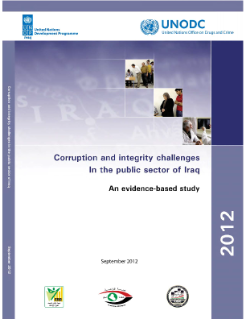Corruption in Iraq's Public Sector
Corruption in Iraq's Public Sector
June 18, 2013
This landmark study, produced in collaboration with the UN Office on Drugs and Crime and Iraq's Commission of Integrity, offers new evidence to assist the understanding, scope and types of corruption affecting Iraq, with a focus on specific experiences rather than generally held perceptions. 31,000 civil servants were surveyed for the study which covered working conditions, job satisfaction, the integrity of civil servants and the issues of bribery and transparency in Iraq.
With more than half of the participants perceiving corruption to be on the rise and with the average interviewee paying almost four bribes a year, this study holds particular significance. “Corruption continues to affect the lives of the majority of Iraqis. This study not only sheds new light on the issue but provides a baseline for the Government of Iraq and the UN to respond,” said Jacqueline Badcock, Resident Representative of the UN Development Programme, which oversaw the study.
The study reveals that although positive steps have been taken to curtail corruption, illustrated by an increase in suspected corruption cases being reported, from 786 in 2004 to 12,520 in 2011, a number of significant challenges remain to address corruption in Iraq’s public sector. 35 per cent of civil servants were hired without undergoing a formal selection process and bribes have led to dissatisfaction with much of Iraq’s public services.
66.3 per cent of the civil servants interviewed did not feel comfortable reporting instances of corruption and few cases of bribery were actually reported to the correct oversight authorities, including Iraq’s Commission of Integrity and its Office of the Inspectors-General.
The study was carried out in partnership with the UN Office on Drugs and Crime, the Kurdistan Regional Statistical Office, as well as the Central Statistical Office and the Iraq Commission of Integrity.
Highlights
- On average, Iraqi bribe-payers pay almost four bribes a year.
- A large proportion of citizens perceive that corruption is on the rise: 54% believe that corruption is more widespread today than two years ago.
- Large regional variations across Iraq exist in the prevalence of bribery (Baghdad: 29.3%, other governorates: 10.2%, Kurdistan Region: 3.7%).
- 45.8% of bribe-payers paid a bribe to speed up an administrative procedure, while 26.6% to improve treatment or service.
- The prevalence of bribery is highest amongst citizens dealing with police, land registry and tax and revenue officers.
- Civil servants in Baghdad (5.2%) are more likely to be offered bribes than civil servants in other governorates (3.8%).
- Almost 60% of civil servants have been offered bribes.
- Out of all citizens who pay bribes, only 4.5% report it to a relevant authority, such as police, prosecutors or the Commission of Integrity.
- 66.3% of all civil servants would not feel adequately protected if they were to report an act of corruption in their own ministry.
- 22.7% of all civil servants state that they would like to learn more about integrity and anti-corruption in their work, only 6.7% have ever attended training on these topics.

 Locations
Locations